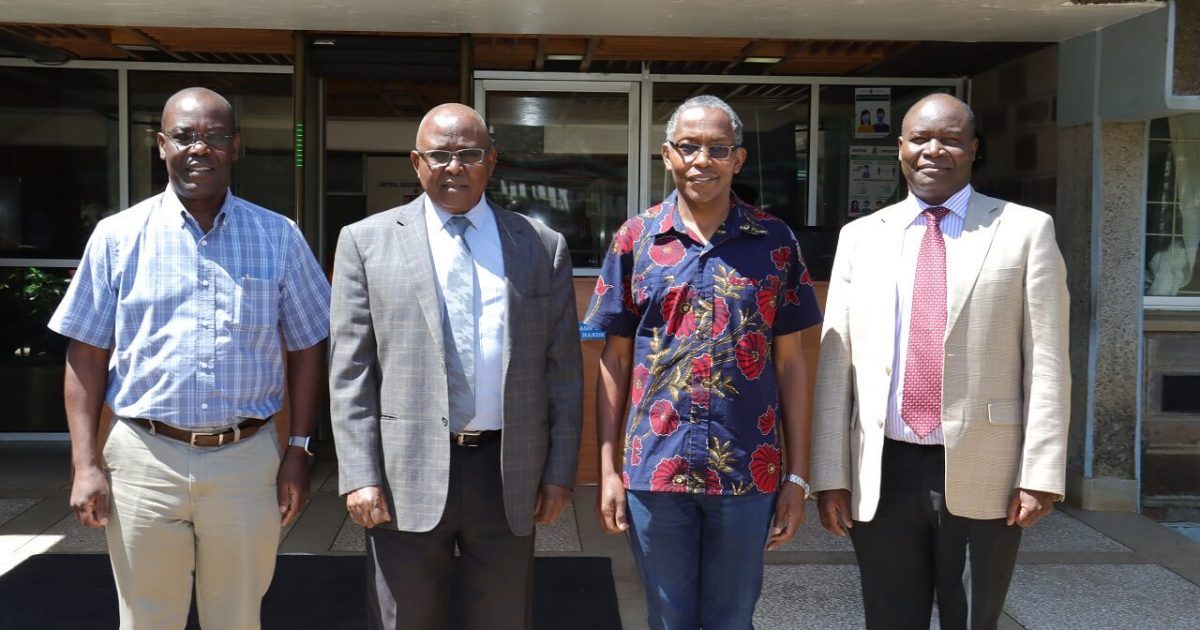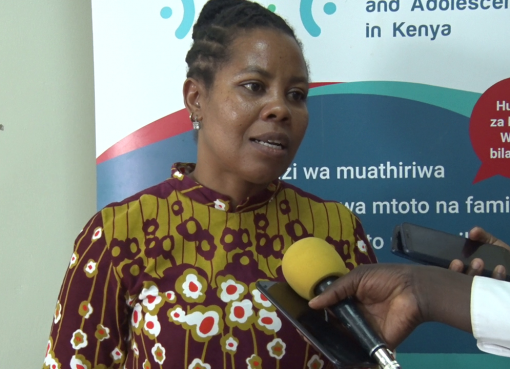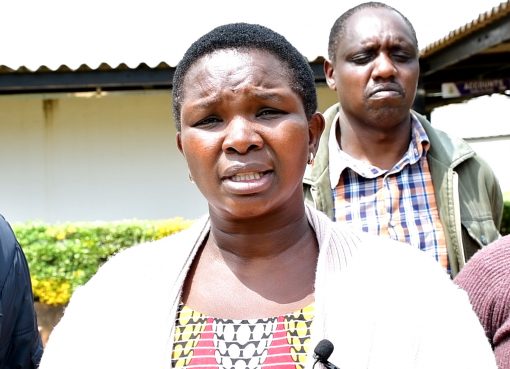The Cooperative University of Kenya is seeking a collaboration with Egerton University in activating the Sh114 million African Development Bank(AfDB) funded Kenya Rural Transformation Centres Digital Platform (KRTCDP).
KRTCDP will put farmers at the center of a single electronic platform and connect them with all actors along the agricultural sector value chain is scheduled to be hosted at the Lord Egerton Agro-Industrial Park Zone and will initially involve Nakuru, Narok, and Baringo Counties.
According to Cooperative University of Kenya (CUK) Vice-Chancellor Prof. Kamau Ngamau one of the biggest challenges that farmers are facing is a lack of information especially in the wake of climate change, which has hit the farming sector hard.
He noted that the lack of a centralized depository where farmers can access timely information, not only on weather, but also on other key things such as the market and access to inputs, has left them on their own.
Prof. Ngamau indicated that the project aligns with the Government’s strategy to establish Special Agro Processing Zones (SAPZs), under the Agricultural Sector Transformation and Growth Strategy.
He added that the three-year project that will benefit the three counties will initially focus on maize, Irish potatoes, and dairy farming.
“Modern technology is key and is the only way to bring the youth on board and make them smart farmers. This project will be using the digital platform and digital centers where the young farmers can get information and see interest and opportunities in the agriculture sector,” he said.
Speaking during talks with his Egerton University counterpart Prof. Isaac Kibwage on the KRTCDP Project’s progress and collaborative avenues for its successful implementation, Prof. Ngamau explained that the KRTCDP platform is aimed at putting farmers at the centre of a single electronic platform and connecting them with all actors along the agricultural sector value chain, including the metrological Department, so that they can get timely forecasts for appropriate planning.
Through the shared digital platform, farmers will be able to easily interact with various stakeholders in the agriculture chain on a mobile phone platform.
The project, he added, is in line with the Nation’s development plan, which is, to revive and make the agriculture sector profitable and sustainable for better livelihoods and the effort resonates very well with the aspirations of the new National Government’s Agriculture Sector Transformation and Growth Strategy (ASTGS) 2019-2029.
ASTGS lays out the Special Economic Processing Zones to implement in Kenya to harness agricultural development.
“Strengthening the key agricultural value chains is the way to go and the Bottom-Up Economic Transformation Agenda (BETA) emphasizes as much. The 2023-24 budget is also set to finance agricultural activities with specific emphasis on the value chains. This project is therefore very timely as it seeks to link smallholder farmers to the forward and backward linkages, on the same digital platform,” Prof. Ngamau said.
This project seeks to link smallholder farmers with all relevant stakeholders on the same digital platform, hence creating a one-stop shop for producers.
“The digital platform becomes important because producers will always be linked to the market end and the agribusiness comes on board as we need the young people to do business not just produce food the way our parents are doing. It will help farmers in decision-making through access to agribusiness services and information such as the broadcast of agricultural-cycle information on weather forecasts, wholesale and retail commodity prices,” Prof. Ngamau observed.
The KRTCDP Project is being implemented by CUK, with financial support from the AfDB through the Fund for African Private Sector Assistance (FAPA).
The CUK Vice-Chancellor expressed optimism that the project will transform the way agriculture is done in the country by bringing resources, and access to inputs and also bring in value addition and source markets for farmers.
The cooperatives, he added, will be agents to implement this project considering there has been lack of information about markets and also post-harvest losses that have seen farmers losing almost 40 percent of their products,” he said.
Prof. Ngamau noted that through the transformation centres digital platform project that is designed to enable smallholder farmers to connect to all critical players in the agricultural forward and backward value chains, the shared farmers’ platform will be able to easily engage input suppliers, agro-dealers, financiers, insurance agencies, marketers and buyers, among other service providers, on a mobile phone platform.
The project and digital centres, he said, will also attract youth in agriculture and this he noted will be a game changer that will also create jobs. Currently, agriculture has an aging fraternity.
“Youths will be providers of services, there will be creation of jobs and contribution tremendously in the bottom-up economic transformation agenda of the government,” Prof. Ngamau said.
In his remarks, the Egerton University Vice Chancellor observed that the platform is timely and will benefit farmers with relevant information that they have been lacking over the years.
“I am happy this platform will give timely information on weather, enabling farmers to plan accordingly based on the forecast,” said Prof. Kibwage.
He added “The goal of the project is to increase productivity, profitability and sustainability of agricultural cooperatives, and to consequently impact the entire agriculture/food and trade value chains, spurring holistic growth across Kenya’s agricultural sector,” he said.
Prof. Kibwage disclosed that Egerton University was committed to supporting initiatives that seek to give value, incentivize, aggregate data and resources and accrue trust among players in the agriculture sector and value chains.
He emphasized the importance of research and innovation as a means to solve Kenyan challenges.
The VC said research provides opportunities to develop resilient solutions to challenges faced by Kenyans, and that research remains a key component to the development of any nation.
“It is what I like to call Kenyan ‘challenges’ solved by Kenyan researchers. I choose to use the phrase challenges and not problems and the simple reasoning is that challenges have solutions, such as the ones we are going to experience during this project implementation, while problems create more problems,” he said.
Prof. Kibwage said special attention and resources ought to be directed towards research, adding that nations that do not have their own research facilities struggle when faced by calamities and pandemics.
He expressed confidence that the platform will enable farmers to be more productive, earn higher incomes, and, most importantly, create sustainability in their farming operations.
“They will have access to information that will empower their decision-making capacities. Aggregation of their produce will reduce post-harvest losses and empower farmers to have higher bargaining power. With the successful implementation of the project, the farmer wins,” the VC said.
By Anne Mwale





